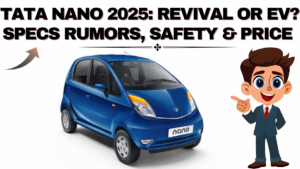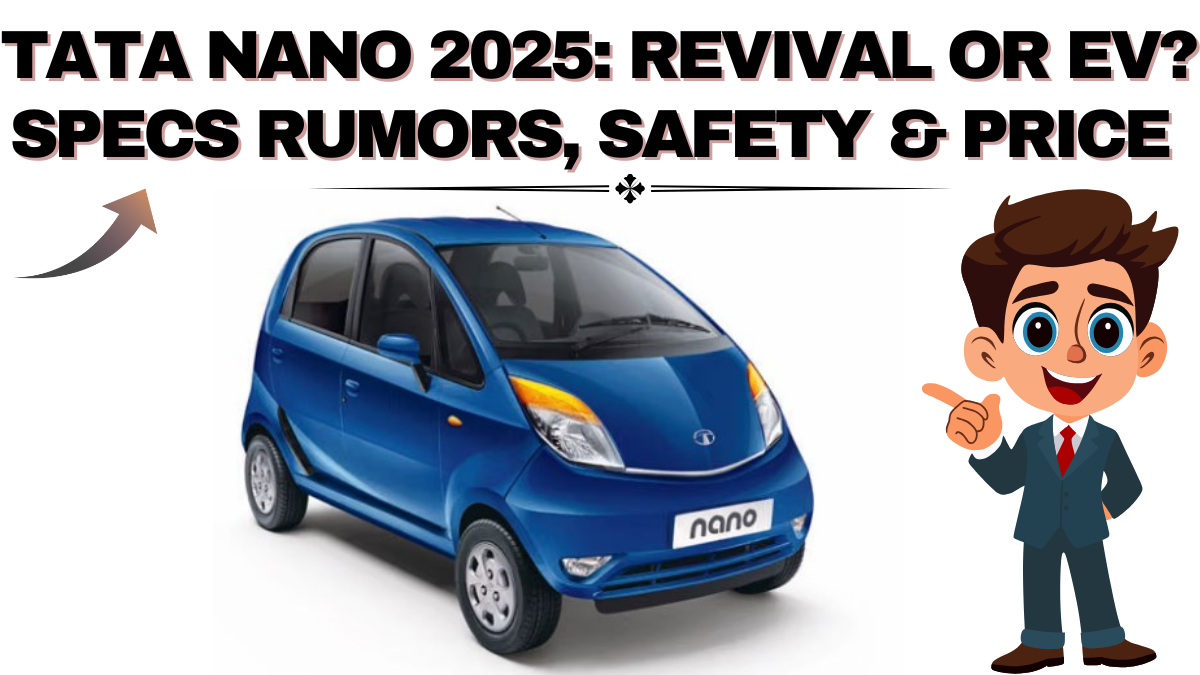The Tata Nano, once hailed as the world’s cheapest car, is back in the headlines in 2025. Originally launched in 2008 as a budget-friendly hatchback for the masses, the Nano faced challenges with perception, safety, and marketing despite its affordability. Production was officially discontinued in 2018, but rumors about a revival in an electric avatar have been swirling for the past two years.
In October 2025, the buzz is stronger than ever: Will Tata Motors actually bring back the Nano in an EV version, or will it remain a concept confined to speculation? Let’s break down the possibilities, expected features, safety aspects, and the likely pricing if the Tata Nano 2025 does make its comeback.

Why Tata Nano Could Return
The Indian car market has changed drastically since the Nano’s exit. With rising fuel prices and the government’s push towards electric mobility, the Nano could find a new lease of life as a compact, affordable electric city car.
Reasons for potential comeback:
-
Growing demand for budget EVs under ₹10 lakh
-
Tata’s success with Nexon EV and Tiago EV boosting confidence
-
Increasing charging infrastructure in urban areas
-
Government incentives for small electric cars
-
Strong recall value of the Nano brand despite its past struggles
This makes 2025 the perfect time for Tata to consider reintroducing the Nano in a modern EV form.
Expected Powertrain and Specs
If revived, the Nano 2025 will almost certainly be launched as an EV rather than a petrol car. Based on industry reports and market expectations, here’s what it could look like:
| Variant | Battery Pack | Range (Expected) | Power | Torque | Charging Time |
|---|---|---|---|---|---|
| Base Nano EV | 15 kWh | 150–180 km | 35 hp | 80 Nm | 6–7 hrs (AC), 1 hr (DC fast charge) |
| Nano EV Plus | 25 kWh | 250–300 km | 45 hp | 110 Nm | 8–9 hrs (AC), 1.5 hrs (DC fast charge) |
Highlights:
-
Compact size ideal for city driving and daily commutes
-
Affordable running cost with low per km charge
-
Lightweight build ensures better efficiency
-
Range of 150–300 km makes it practical for urban buyers
Design and Styling
The Nano’s design is expected to be refreshed for modern appeal while retaining its compact city-car proportions.
-
Redesigned front fascia with EV-specific closed grille
-
LED DRLs and projector headlamps
-
15-inch alloy wheels replacing old small tyres
-
Dual-tone paint options with EV-themed blue highlights
-
Sleeker body lines for aerodynamic efficiency
-
LED tail lamps with sporty styling
This would allow Tata to position the Nano as a stylish yet affordable EV hatchback.
Interior and Features
The old Nano was criticized for being too basic. If the Nano 2025 launches, it will likely offer modern features expected from even entry-level cars.
-
7-inch touchscreen infotainment with Android Auto & Apple CarPlay
-
Digital instrument cluster with EV range display
-
Fabric or leatherette upholstery options
-
Automatic climate control in higher trims
-
USB-C charging ports and wireless charger
-
Basic connected car features for remote monitoring
-
Foldable rear seats for additional boot space
These upgrades would make the Nano more practical and appealing to urban buyers.
Safety Upgrades
Safety was one of the Nano’s biggest drawbacks earlier. The 2025 version, if launched, must meet modern safety norms.
Expected safety features:
-
Dual airbags as standard
-
ABS with EBD
-
Rear parking sensors and camera
-
ISOFIX child seat mounts
-
High-strength steel frame for better crash protection
-
Speed alert and seatbelt reminders
-
Electronic Stability Program in higher trims
These would make the Nano 2025 safer than its predecessor and compliant with Bharat NCAP standards.
Price in India (Expected October 2025)
If the Nano 2025 EV launches, Tata will likely price it aggressively to attract entry-level buyers.
| Variant | Price (Ex-Showroom India) |
|---|---|
| Tata Nano EV Base | ₹5.5 – ₹6.5 lakh |
| Tata Nano EV Plus | ₹7.5 – ₹8.5 lakh |
On-road pricing could range between ₹6.2 lakh and ₹9.5 lakh, making it one of the most affordable EVs in India.
Pros and Cons of Tata Nano 2025
Pros
-
Affordable entry point into EV ownership
-
Compact and perfect for city driving
-
Tata’s proven EV reliability and service network
-
Government incentives for small EVs
-
Lower running and maintenance costs
Cons
-
Limited space compared to premium hatchbacks
-
Lower top speed (~110–120 km/h)
-
Range anxiety for long-distance drives
-
Competition from EV scooters in the same budget
Rivals in 2025
If launched, the Nano EV will compete with both small EVs and entry-level petrol cars.
| Model | Powertrain | Price Range | USP |
|---|---|---|---|
| Tata Nano EV (Expected) | 15–25 kWh EV | ₹5.5 – ₹8.5 lakh | Affordable small EV |
| Tata Tiago EV | 19–24 kWh EV | ₹7 – ₹10 lakh | More features, bigger size |
| MG Comet EV | 17.3 kWh EV | ₹7.5 – ₹9.5 lakh | Compact urban EV |
| Maruti Alto K10 | Petrol | ₹5 – ₹7 lakh | Budget petrol hatchback |
The Nano EV would be India’s most affordable electric hatchback, giving it a huge competitive edge.
Who Should Buy It?
-
First-time car buyers in metro cities
-
Families needing a second small car for city use
-
Eco-conscious buyers looking for budget EV options
-
Students and working professionals with daily commutes under 50 km
Who Should Avoid It?
-
Buyers needing long-distance highway driving
-
Families wanting spacious hatchbacks with large boots
-
Enthusiasts seeking high performance and premium features
Conclusion
The Tata Nano 2025 is surrounded by strong speculation, but if it comes back as an EV, it could completely reshape India’s budget car and EV market. With compact size, low price, and eco-friendly benefits, it would be an ideal urban commuter.
While nothing is officially confirmed, the Nano’s brand value, nostalgia, and Tata’s EV leadership could make this comeback a reality. If priced right, the Nano EV could once again be a car for the masses, but this time future-ready with electric power.
FAQs
Is Tata Nano 2025 confirmed?
No, it is still in speculation, but strong industry rumors suggest a possible EV revival.
What would be the expected price of Tata Nano EV?
It could launch between ₹5.5 lakh and ₹8.5 lakh ex-showroom.
What will be the range of Tata Nano EV?
Expected range is 150–300 km depending on battery size.
Why did the old Tata Nano fail?
It failed due to safety concerns, marketing perception, and limited features, despite being affordable.
Who will be its main rivals?
It will compete with the Tata Tiago EV, MG Comet EV, and entry-level petrol hatchbacks like Maruti Alto K10.
Click here to know more.
